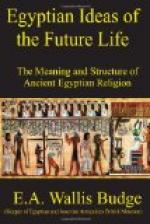I, [Footnote: Ed. Maspero, line 570.] it is said:
“Pepi is the son of R[=a] who loveth him; and
he goeth forth and raiseth himself up to heaven.
R[=a] hath begotten Pepi, and he goeth forth and raiseth
himself up to heaven. R[=a] hath conceived Pepi,
and he goeth forth and raiseth himself up to heaven.
R[=a] hath given birth, to Pepi, and he goeth forth
and raiseth himself up to heaven.” Substantially
these ideas remained the same from the earliest to
the latest times, and R[=a] maintained his position
as the great head of the companies, notwithstanding
the rise of Amen into prominence, and the attempt
to make Aten the dominant god of Egypt by the so-called
“Disk worshippers.” The following
good typical examples of Hymns to R[=a] are taken
from the oldest copies of the Theban Recension of the
Book of the Dead.
I. FROM THE PAPYRUS OF ANI. [Footnote: See The Chapters of Coming Forth by Day, p. 3.]
“Homage to thee, O thou who hast come as Khepera, Khepera the creator of the gods. Thou risest and thou shinest, and thou makest light to be in thy mother Nut (i.e., the sky); thou art crowned king of the gods. Thy mother Nut doeth an act of homage unto thee with both her hands. The laud of Manu (i.e., the land where the sun sets) receiveth thee with satisfaction, and the goddess Ma[=a]t embraceth thee both, at morn and at eve. [Footnote: i.e., Ma[=a]t, the goddess of law, order, regularity, and the like, maketh the sun to rise each day in his appointed place and at his appointed time with absolute and unfailing regularity.] Hail, all ye gods of the Temple of the Soul, [Footnote: i.e., the soul referred to above in the account of the creation; see p. 24.] who weigh heaven and earth in the balance, and who provide divine food in abundance! Hail, Tatunen, thou One, thou Creator of mankind and Maker of the substance of the gods of the south and of the north, of the west and of the east! O come ye and acclaim R[=a], the lord of heaven and the Creator of the gods, and adore ye him in his beautiful form as he cometh in the morning in his divine bark.
“O R[=a], those who dwell in the heights and those who dwell in the depths adore thee. The god Thoth and the goddess Ma[=a]t have marked out for thee [thy course] for each and every day. Thine enemy the Serpent hath been given over to the fire, the serpent-fiend Sebau hath fallen down headlong; his arms have been bound in chains, and thou hast hacked off his legs; and the sons of impotent revolt shall nevermore rise up against thee. The Temple of the Aged One [Footnote: i.e., R[=a] of Heliopolis.] (i.e., R[=a]) keepeth festival, and the voice of those who rejoice is in the mighty dwelling. The gods exult when they see thy rising, O R[=a], and when thy beams flood the world with light. The Majesty of the holy god goeth forth and advanceth even unto the land of Manu; he maketh brilliant the earth at his birth each day; he journeyeth on to the place where he was yesterday.”
II. FROM THE PAPYRUS OF HUNEFER. [Footnote: From the Papyrus of Hunefer (Brit. Mus. No. 9901).]




